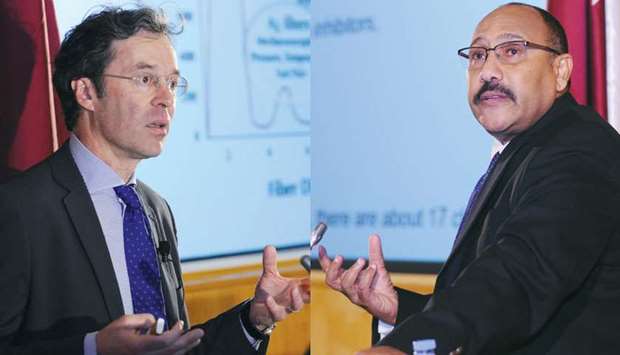Two leading experts in their respective fields of medicine spoke at Weill Cornell Medicine - Qatar’s Grand Rounds to discuss neuropathic pain and antibiotic resistance.
Visiting expert Prof Giuseppe Lauria, director of the department of clinical neurosciences at the Carlo Besta Neurological Institute, Milan, gave a presentation entitled ‘Big pain, small fibres’ which discussed the determinants of neuropathic pain, the physiology and pathology of small nerve fibres, and various treatments for painful neuropathy.
Small fibre neuropathy can be caused by many different diseases, including diabetes, and is characterised by pain, loss of sensation, and burning or tingling sensations. It is caused by damage to the small nerve fibres and usually affects the extremities.
“Chronic neuropathic pain affects around 5% of the general population. It has a major impact on the patient’s quality of life and increases healthcare costs substantially. The other very important thing is that there are no tailored treatments - we treat patients with the same available drugs. But in the last few years we have begun moving towards precision medicine approaches for neuropathic pain which is a big challenge but also could bring great benefits to patients,” Prof Lauria said.
Dr Ali Sultan, associate professor of microbiology and immunology at WCM-Q spoke on the growing problem of antibiotic resistance. He explained that antibiotic resistance occurs when bacteria change and become resistant to the antibiotics used to treat the infections they cause.
“Antibiotic resistance has several causes, including the misuse or over-prescription of antibiotics by doctors, patients not completing their treatments, poor infection control in hospitals, and the overuse of antibiotics in animal husbandry,” Dr Sultan said.
“Antibiotics are a limited resource because there is a growing rate of resistance. Globally we are not using antibiotics appropriately and there are very few new antibiotics being discovered. This is an alarming trend.”
Dr Sultan then discussed the Global Action Plan to combat antimicrobial resistance (AMR), adopted by the World Health Organisation in 2015. This calls on member states to develop national plans to raise awareness of AMR, improve surveillance, invest in research and development, and reduce incidence of infection in healthcare institutions, the wider community and animals.

Prof Giuseppe Lauria asnd Dr Ali Sultan


